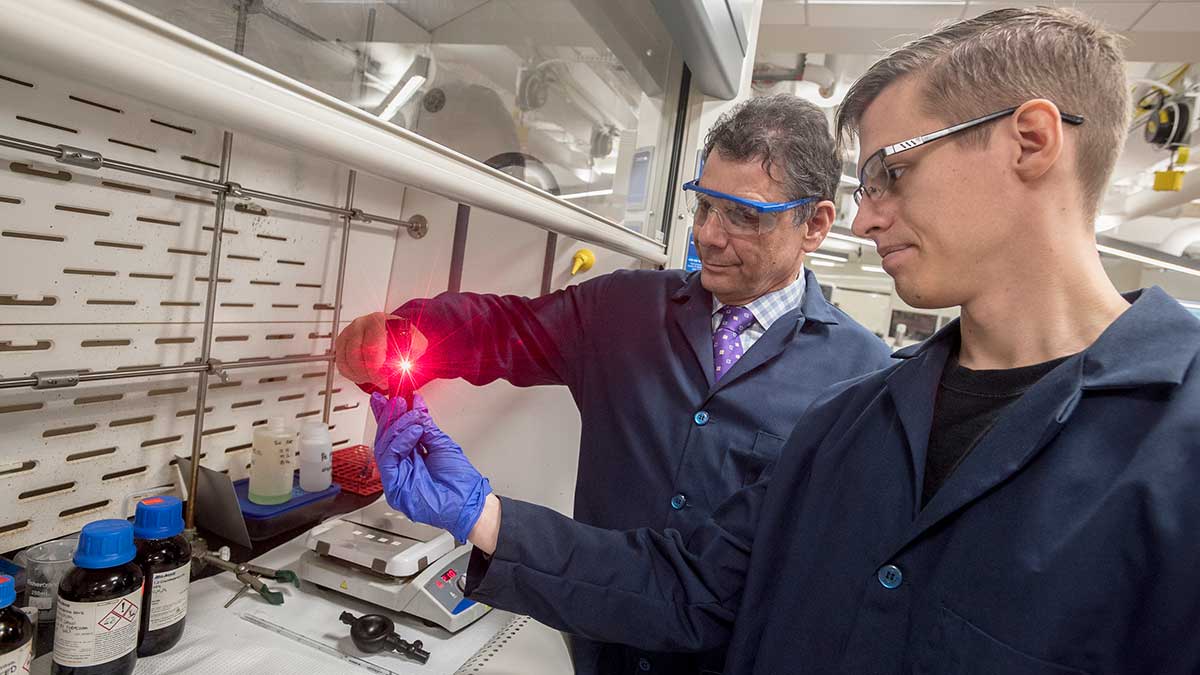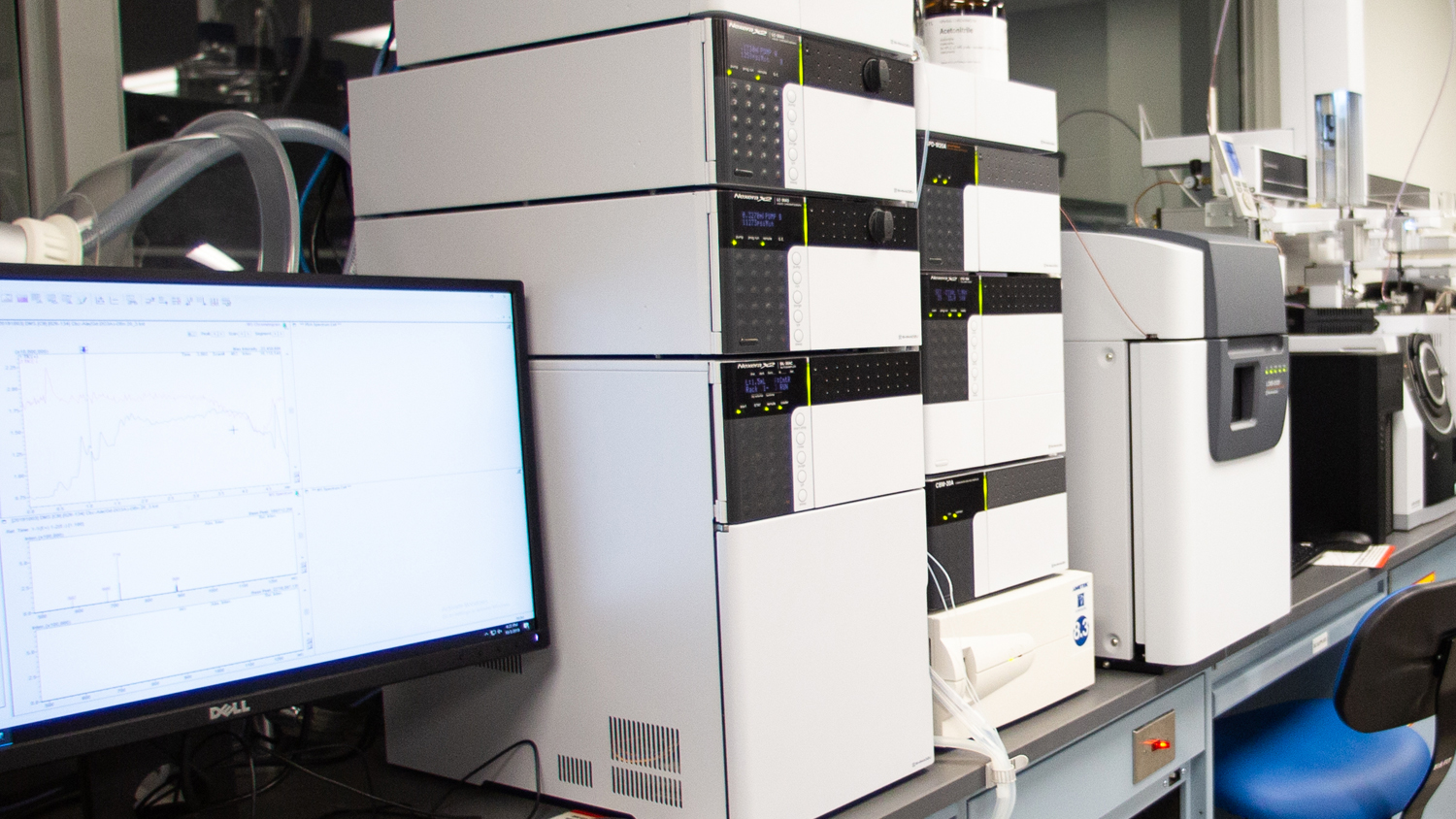School of Chemistry and Materials Science

School of
Chemistry and Materials Science
- RIT/
- College of Science/
- Academics/
- Schools and Centers/
- School of Chemistry and Materials Science
Revolutionizing modern society through the synthesis of materials and medicines, and probing the fundamental processes of life.
Overview
RIT offers undergraduate and graduate degree programs that prepare you for professional work in research laboratories and industrial settings. The materials science graduate program seeks to provide solutions for several different fields, including energy, medicine, clothing, and equipment production.
Good to Know
- Chemistry and Biochemistry majors learn about the structure, composition, properties, and behaviors of molecules, giving them a strong foundation in preparation for a wide range of careers involving energy, medicine, materials, food, the environment, and sustainability.
- Chemistry and Biochemistry majors are highly competitive applicants for acceptance into veterinary school, medical and dental school, and various graduate programs.
- Graduate students in the materials science program learn problem-solving skills in several fields, including energy, medicine, clothing, and equipment production.
Typical Job Titles
BS Degree
Research Lab Technician
Research Assistant
Science Writer
Analytical Chemist
Government Analyst
Materials Engineer
Plant Operations
Quality Analyst
BS + Grad/Professional Degree
Senior Scientist
Senior Research Specialist
Professor
Analytical Chemist
Patent Lawyer
Doctor/Dentist
Veterinarian
Process Chemist
Featured Work and Profiles
-
Connecting Biochemistry and Business: A Remarkable RIT Journey
Oreoluwa Fatimilehin found her path at RIT, combining science and business to build a successful career as a Product Attorney navigating tech’s legal challenges.
Read More about Connecting Biochemistry and Business: A Remarkable RIT Journey -
Chemistry, Culture, and Career - How RIT Shaped a Merck Scientist
Nnamdi Akporji ’16 came to RIT for its culture and discovered a passion for chemistry and research. He is now a Senior Scientist at Merck & Co., turning ideas into products.
Read More about Chemistry, Culture, and Career - How RIT Shaped a Merck Scientist -
From Pioneering Cancer Research Journey to Prestigious Goldwater Scholarship Award
Student Emily Mahoney has been awarded the prestigious Goldwater Scholarship for her outstanding cancer research accomplishments and contributions.
Read More about From Pioneering Cancer Research Journey to Prestigious Goldwater Scholarship Award -
VP of Research and Development in a Science-first Cannabis Company
Lauren Tamburro wanted to be acknowledged as a serious scholar, so she chose RIT. Today, she is the VP of Research and Development at Vertosa, Inc.
Read More about VP of Research and Development in a Science-first Cannabis Company -
From Student Support to Student Success in Chemistry MS
Kaitlyn Clark chose RIT for its access services and began as a mathematics major. With the support from multiple faculty members, she discovered chemistry and is now an MS graduate.
Read More about From Student Support to Student Success in Chemistry MS -
Climate Change Course: Complex Teams Solving Complex Problems
Mary Pryor RIT students from all majors learn creative and interdisciplinary problem-solving through the perspectives of a diverse set of faculty members.
Read More about Climate Change Course: Complex Teams Solving Complex Problems
Undergraduate Programs
RIT’s chemistry and biochemistry programs feature rigorous, in-depth curricula that remain flexible enough to allow students to specialize in several other related fields. We offer robust undergraduate research and laboratory teaching experience opportunities, often as early as freshman year, with faculty mentorship and state-of-the-art facilities and instrumentation.
Study the chemistry of life to prepare for careers in biotech, pharma, forensics, and agriculture.
Learn more about the Biochemistry BS programIn RIT’s chemistry BS, you’ll research chemicals to discover, develop, or improve products like paints, pharmaceuticals, cosmetics, electronic components, and more.
Learn more about the Chemistry BS programGraduate Programs
Our chemistry and materials science and engineering graduate programs prepare professional scientists by offering curricula that allow students to specialize in their chosen fields while engaging in rigorous, meaningful research using state-of-the-art instrumentation and facilities, under the guidance of a faculty mentor.
A master’s degree in chemistry that prepares you to be an independent researcher in a wide array of chemical disciplines, including your chosen specialty.
Learn more about the Chemistry MS programBuild expertise in materials design and manufacturing with this flexible engineering certificate.
Learn more about the Materials Science and Engineering Adv. Cert. programThe materials science and engineering MS combines science, engineering, and sustainability to solve challenges of diverse industries ranging from medicine to energy.
Learn more about the Materials Science and Engineering MS programMinors and Immersions
All of the required or optional courses for the chemistry immersion are core chemistry courses within the chemistry curriculum.
Learn more about the Chemistry Immersion programChemistry is intrinsically a part of our society from the fuels we use, the air we breathe, and the water we drink to the complex chemical behaviors of our own bodies. Chemistry is involved in the development of myriad materials such as computer chips, packaging materials, and alternative fuels. Increasing numbers of policy and ethical choices facing the global community involve issues where chemistry plays a pivotal role. This minor provides students with the opportunity to study chemistry in order to build a secondary area of expertise in support of their major or as an additional area of interest.
Learn more about the Chemistry Minor programCooperative Education
What’s different about an RIT education? It’s the career experience you gain by completing cooperative education and internships with top companies in every single industry. You’ll earn more than a degree. You’ll gain real-world career experience that sets you apart. It’s exposure–early and often–to a variety of professional work environments, career paths, and industries.
Co-ops and internships take your knowledge and turn it into know-how. Science co-ops include a range of hands-on experiences, from co-ops and internships and work in labs to undergraduate research and clinical experience in health care settings. These opportunities provide the hands-on experience that enables you to apply your scientific, math, and health care knowledge in professional settings while you make valuable connections between classwork and real-world applications.
Chemistry Research Scholars Program
Undergraduate research is one of the greatest strengths of our School of Materials and Chemistry Science programs. Alumni often come back to report that their undergraduate research experience is what set them apart upon graduation and strongly poised them for success. Students are encouraged to participate in undergraduate research experience under the guidance of faculty mentors as early as their freshman year. Students can also apply for summer research internships at RIT and other institutions. Once a student has worked at least one semester with a faculty mentor in our school, they may apply to the Chemistry Research Scholars Program.
Faculty
Faculty in the School of Chemistry and Materials Science at RIT are experts in their field of study. They bring their professional skills and experience to the classroom, teaching, and research labs. Our faculty are scientists who strive to make the world a better place. Chemistry, biochemistry, and materials science are central to the knowledge and skill sets necessary to address our global challenges.
What types of challenges are you interested in learning how to solve?
Meet our faculty and which challenges their research projects address.
Latest News
-
May 22, 2025

RIT researchers develop self-healing photopolymers for 3D printing to enhance part longevity and sustainability
3D Printing Industry discusses the research of Christopher Lewis, associate professor in the Department of Manufacturing and Mechanical Engineering Technology; graduate student Vincent Mei; and biomedical and chemical engineering Ph.D. student Kory Schimmelpfenning, which focuses on self-healing photopolymers for 3D printing that should enhance part longevity and sustainability.
-
May 13, 2025

RIT showcase offers glimpse of early tech innovation cycle
TechTarget speaks to Paloma Hamilton, fifth-year mechanical engineering student; Geoff Twardokus, electrical and computer engineering Ph.D. student; and Christopher Collison, director of RIT's AI Hub and Initiatives, about the innovative developments featured at Imagine RIT.
-
April 28, 2025

Tackling the macro problem of microplastics
RIT experts are at the forefront of research that aims to better understand the impact of microplastics on the environment. RIT’s interdisciplinary microplastics team has received nearly $10 million in funding since 2020.
Would you like to donate to our school?
Your gift helps the university support students, attract great faculty members, and maintain leading-edge academic programs.
































